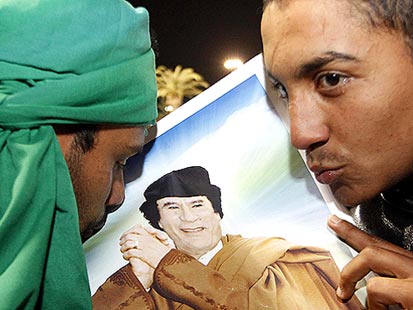
Moscow Uses Circassians to Offer Assistance to Libyan Leader Qaddafi
Publication: Eurasia Daily Monitor Volume: 8 Issue: 70
By:

On April 5, a statement made by a group of Circassians to the embattled head of Libya, Muammar Gaddafi, spread in the Internet. An Israeli specialist on the Circassians, Avraham Shmulevich republished the highly unusual statement offering Circassian assistance to Gaddafi on his blog. The statement’s anonymous signatories, calling themselves “the Circassians of the Caucasus,” accused multinational companies and, presumably, Western governments of having put to the test the strength of the Libyan state and Libyans’ “fortitude and love for freedom.” The signatories also thanked Gaddafi for hosting Circassians in Libya and asked him to allow them to come to his rescue, to defend his rule with arms (https://avrom-caucasus.livejournal.com/109521.html).
Given an extremely precarious security situation in the largest Circassian-populated territory in the North Caucasus, Kabardino-Balkaria, it is bewildering that some Circassians may have considered traveling to Libya to defend Gaddafi’s cause. The irony of the situation is especially glaring given that earlier, on March 23, a North Caucasian Circassian website, Natpress.net, translated and republished information from a Jordanian Circassian website, Circassiannews.com, dismissing Gaddafi’s plea for assistance. According to the latter, a Gaddafi envoy met with Jordanian Circassians in Amman, asking them to influence their ethnic brethren living in the strategically important coastal cities of Misrata and Benghazi to switch to his side. Misrata and Benghazi have been anti-Gaddafi rebels’ strongholds and are, respectively, the third and second largest cities after Tripoli. There are reportedly 20,000 Circassians living in Misrata and 10,000 reportedly reside in Benghazi. The Jordanian Circassians allegedly rejected Gaddafi’s request, citing, in particular the UN resolution on the situation in Libya (www.natpress.net, March 23).
Circassians traditionally lived throughout the Ottoman Empire, which once included North Africa, and were known as brave soldiers. So despite their relatively small numbers in Libya, they still may be considered a force to be reckoned with. So far, however, they apparently have sided against Gaddafi or at least are indifferent to his cause. The Circassian activists easily coordinate their actions via the Internet, so it is hard to imagine that the Circassians in the North Caucasus were unaware of the Libyan Circassians’ stance against the Gaddafi regime.
Besides, Article 359 of the Russian Criminal Code expressly prosecutes mercenaries, so the Russian authorities must have launched an investigation into the intention of some of its citizens to go and fight for a foreign government. To date no information about prosecutions has come to light, so it is safe to conclude that the authors of the address to Gaddafi had tacit or open government support for the initiative. Earlier, President Dmitry Medvedev and Prime Minister Vladimir Putin diverged on coalition actions in Libya. Medvedev condemned the Gaddafi regime while Putin harshly criticized the West for its military actions in Libya. Presenting the Circassians as a manifestly anti-Western people serves the Russian government well. Moscow appears to perceive the West as virtually the main player fomenting dissent among the Circassians. Since Circassian activists have demanded that Moscow acknowledge the “Circassian genocide” in the North Caucasus and move the 2014 Winter Olympic Games from Sochi, where the alleged genocide took place in the second half of the 19th century, the Russian government may be interested in tarnishing the image of Circassians in the West.
Recent destabilization in Kabardino-Balkaria, Circassian civil activism with some attention from the international community, and a resulting threat to the 2014 Winter Olympics in Sochi have elevated the Circassian issue to unprecedented levels inside Russia. In the past Circassian claims about genocide, which were made even before the decision to hold the Olympic Games in Sochi, were dismissed or ignored in Moscow. Now, conferences on the Circassian issue are being held with increased regularity in the Russian capital. Two events were held in the past several weeks, including a conference at the Moscow State Institute of International Relations (MGIMO), which prepares Russian diplomats. The Russian Public Chamber is scheduled to hold a conference in Moscow on April 12 on the problem of the radicalization of the youth in Kabardino-Balkaria (www.elot.ru, April 6).
For the first time in years, Russian experts started to talk about possible “compensatory actions” to appease the Circassians and decrease their opposition to the Sochi Olympics. A Moscow ethno-psychologist, Elena Nevelskaya, proposed merging Adygea and Krasnodar Krai into the North Caucasian Federal District. Both Adygea and Krasnodar Krai were historically Circassian lands but currently have only small Circassian minorities. So while the move would symbolically achieve the “unity” of the Circassians in one district, the Circassians are demanding a single republic for all of their ethnic kin. This proposal is a non-starter, since it is unlikely to satisfy the Circassians and also goes contrary to the original intention of Moscow to separate Krasnodar Krai, where the Winter Olympics are set to take place in 2014, from the unstable North Caucasus. Nevelskaya suggested demolishing monuments dedicated to the most hated Russian generals in the former Circassian lands. The only practical proposal the Russian expert made was to allow the Circassians who live in Turkey, the Middle East and other foreign territories to return to the North Caucasus. Current Russian law allows the return of the “compatriots” to the Russian Federation but requires them to speak Russian, which in practice means that only the citizens of former Soviet republics can come. Also, the North Caucasian republics are not included among the state-designated territories where returnees can be resettled (www.aheku.org, April 6).
The latest trends in Moscow’s policy toward the Circassian issue appear to be aimed at presiding over and leading the discussion about the Circassians by holding conferences in Moscow, away from the North Caucasus. The supposed statement of support for Gaddafi by Circassians seems to be a poorly executed attempt to spoil the reputation of the Circassians in the West. The first signs of possible bargaining with Circassian activists show that Moscow is still not in a position to offer anything substantial to the Circassians, opting instead for symbolic signs of appreciation that can quickly be retracted once the Sochi Olympics are over.




